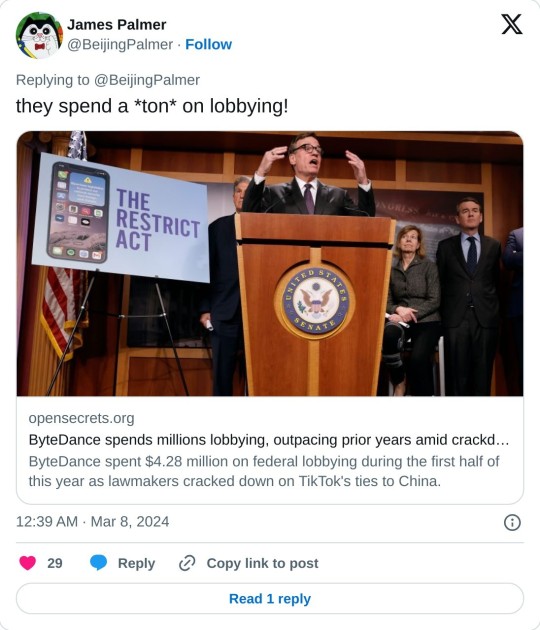#opensecrets
Text
The Environmental Protection Agency unveiled a new proposal Thursday to cut greenhouse gas emissions from thousands of power plants burning coal or natural gas, two of the top sources of electricity across the United States. Sen. Joe Manchin (D-W.Va.), criticizing the “radical” proposal, issued his own scorched earth ultimatum on Wednesday ahead of the announcement.
Manchin, chair of the Senate Energy Committee and the top recipient of contributions from the oil and gas industry during the 2022 election cycle, vowed Wednesday to oppose every one of President Joe Biden’s nominees for the EPA “until they halt their government overreach.”
“This Administration is determined to advance its radical climate agenda and has made it clear they are hellbent on doing everything in their power to regulate coal and gas-fueled power plants out of existence, no matter the cost to energy security and reliability,” Manchin wrote in a statement released Wednesday.

The EPA proposal would require most fossil fuel-fired power plants to slash their greenhouse emissions by 90% between 2023 and 2040. The EPA projects the emissions reduction would deliver up to $85 billion in climate and health benefits over the next two decades by heading off premature deaths, emergency room visits, asthma attacks, school absences and lost workdays.
“Alongside historic investment taking place across America in clean energy manufacturing and deployment, these proposals will help deliver tremendous benefits to the American people — cutting climate pollution and other harmful pollutants, protecting people’s health, and driving American innovation,” EPA Administrator Michael Regan said in a statement issued Thursday.
By 2035, the Biden administration aims to shift all electricity in the U.S. to zero-emission sources including wind, solar, nuclear and hydropower, Roll Call reported. In a written statement, Manchin warned the administration’s “commitment to their extreme ideology overshadows their responsibility to ensure long-lasting energy and economic security.”
Manchin is up for reelection during the 2024 election cycle, but he has not yet announced whether he will run.
Last month, West Virginia Gov. Jim Justice (R) announced his campaign for Manchin’s seat. The Democrat-turned-Republican is among the most popular governors in the country and leads a state former President Donald Trump won by nearly 40 percentage points in 2020.
Manchin has hammered the Biden administration in recent weeks for its implementation of the Inflation Reduction Act, the president’s signature climate change bill that the Democratic senator was instrumental in shaping.
“Neither the Bipartisan Infrastructure Law nor the IRA gave new authority to regulate power plant emission standards. However, I fear that this Administration’s commitment to their extreme ideology overshadows their responsibility to ensure long-lasting energy and economic security and I will oppose all EPA nominees until they halt their government overreach,” Manchin said in his Wednesday statement.
What Manchin did not disclose in his statement, however, is that the EPA proposal would jeopardize one West Virginia coal facility that’s particularly lucrative for Manchin’s family business, Enersystems Inc., POLITICO reported. Enersystems delivers waste coal to the Grant Town power plant, which was reportedly already struggling financially, troubles that are expected to deepen with the strict new climate proposal.
Manchin personally received $537,000 from Enersystems last year, according to POLITICO’s analysis of personal financial disclosures filed with the U.S. Senate, and he has been paid more than $5 million by the company since he was first elected in 2010. His son, Joe Manchin IV, now runs Enersystems. The Senator’s campaign has also benefited from political contributions from Enersystems, OpenSecrets reported last year.
“This is going to make it harder for them to stay around. You won’t find written anywhere in the rule that this is supposed to be putting coal plants out of business, but just do the math,” Brian Murray, director of the Nicholas Institute for Energy, Environment & Sustainability at Duke University, told POLITICO.
In 2020, Manchin’s home state of West Virginia generated about 90% of its power from coal, according to the U.S. Energy Information Administration. By contrast, less than 20% of the energy generated nationally comes from coal. Many states, including neighboring Virginia, are phasing out coal by replacing it with natural gas.
While the U.S. may show signs of moving away from coal, the Federal Energy Regulatory Commission told the Senate Energy Committee earlier this month that the country was not prepared to abandon coal and maintain a reliable energy system.
“Coal is more dependable than gas and yes, we need to keep coal generation available for the foreseeable future,” said Commissioner Mark Christie.
Manchin took another swipe at the EPA on Thursday during an energy committee hearing on permitting reform, when he accused the agency of preventing the development of carbon capture technology by denying companies the permits they need to trap captured carbon underground.
“Don’t tell me that you’re going to invest in carbon capture sequestration when we can’t get a permit to basically sequester the carbon captured,” Manchin said. “This is the game that’s being played. I know it, they know I know it, and we’re not gonna let them get away with it.”
#us politics#news#opensecrets#Environmental Protection Agency#sen. joe manchin#west virginia#Senate Energy Committee#biden administration#president joe biden#2023#clean energy#green energy#natural gas#coal#big coal#fossil fuels#fossil fuel industry#Michael Regan#roll call#Gov. Jim Justice#Inflation Reduction Act#infrastructure bill#infrastructure reform#Enersystems Inc.#politico#U.S. Energy Information Administration#Federal Energy Regulatory Commission
56 notes
·
View notes
Text
Fact-check: Did Ron Johnson take $700,000 from fossil fuel industry?
Fact-check: Did Ron Johnson take $700,000 from fossil fuel industry?
League of Conservation Voters: Republican U.S. Sen. Ron Johnson “called climate change ‘bull—-’ during a record heatwave” and “raked in over $700k in fossil fuel cash.”
PolitiFact’s ruling: True
Here’s why: With passage by Democrats of a new measure aimed squarely at tackling climate change, the issue is taking on a new urgency in the fall election.
(more…)

View On WordPress
#bribes#climate change#fossil fuel#koch brothers#lies#mitt romney#opensecrets#republicans#ron johnson#ted cruz
0 notes
Text
I’ve been spiraling but in a productive way- if you’re interested in resources that help us fight capitalism and republicans with our cash, here are some things I’ve found so far:
-Breaks down the political donations of companies by political party and lists important issues as well as offers alternatives. Lists of top issues can be found here:
-New ethical alternative to Amazon- is it all inclusive? No, it’s new. Is it kinda pricey? Yeah, which is why the money spending bits are only if you can afford them- it’s totally okay if you can’t swing this one, just maybe go to Walmart instead, that’s totally okay.
Speaking of Amazon, some popular book alternatives are Thriftbooks, Half-Price Books, or Chegg for textbooks specifically.
The banner references the writer's thesis on decriminalizing drug use, which in itself is an interesting topic, but this is compilation of anti-capitalist resources and learning tools influenced totally by BIPOC creators if you’re lost like me and don’t know where to start. It sounds alarmist (socialism? Community fridge?) but the Supreme Court is reviewing a case that limited the states’ oversight of federal elections next year which could give the states the ability to throw out a huge number of votes for asinine reasons, meaning democracy is dead and we’re just waiting for the funeral.
The main point is getting involved in your immediate community. I’m struggling with the idea of even just speaking to my neighbors, but there are socialist groups everywhere- I’ll follow up when I make a good connection.
-Check the ACLU website when you can. They have options to donate and get involved based on how much time you have to spare, and they’re a huge organization that’s currently in the courts fighting back nonstop on multiple issues.
Follow BIPOC creators wherever you can! Black and Indigenous people have been talking about these issues for decades, but for a lot of us this is the first time we’ve really stepped in to help. The things you hear might hurt your feelings or make you uncomfortable, but this is how we move forward- by opening our ears, putting away the handmaid’s tale cosplays and coat hanger imagery (seriously, stop), and listening to the people we should have been listening to all along.
TikTok-
@freedomofmovement
- part of Catalyst Consulting, a group focused on training you on how to help- you can find a link to “Municipal Involvement 101” (before you burn it all down, try this!!”) In her linktree and it’s happening this Saturday, July 9th virtually. Entry is $25 but hey, they’re professional organizers.
@witchytwitchytv
-Diné creator that has links to multiple funds you can support in her link tree and honestly I just love her like she will not sugar coat it and she is so dang charming. No sensitive white people tears here, guys, you gotta face your privilege to grow.
The Supreme Court also ruled on June 29th that the federal government has jurisdiction over crimes non-indigenous people commit against indigenous people where tribal councils originally had full jurisdiction meaning that a huge (even bigger than before) portion of these crimes will go unpunished going forward.
This is just what I’ve been able to find in a week of spiraling, so let me know if there’s somewhere I should post this permanently or if you find anything you want to add.
Again, this is do what you can. Not everyone can afford to make the same changes and that’s FINE. The important thing is putting this kind of information out there and getting involved where you can. We got here by being an individualist society, only focused on ourselves. We can get through it by focusing on our communities.
1 note
·
View note
Text
The company I work for has a PAC - not too uncommon, what with citizens united. They sent out an email to all employees today soliciting contributions from employees. This isn't the first message they've sent out about it, there's usually 1-2 messages about this a year. But today was the first time it came and I actually had the attention available to pull down some csv's from open secrets and start looking at names and contributions.
It's really uncomfortable to see the company you work for donating to politicians who voted for the national trans sports ban. That was all I had energy to go through, the votes for one bill. Sure 60ish percent of the money went to candidates that opposed it - but the 40% that went to yea votes went to fairly vocal people. People who signed on as cosponsors in the first 20 days after the bill was inteoduced. Ones who when you Google their name + transphobia you get hits from 2016, in one case even earlier.
And that's 2 days before pride. I know complaining won't do anything. They didn't violate any ethics rules. I'm not in a role that has any policy impact. But the fact that if I say something I'm the problem, that funding people who call themselves fascists and advocate genocide isn't an issue "because that's not why we funded them?" "Funding isn't the same as endorsing."
Fuck. This is why you never work harder than you have to for the minimum, kids. Because companies do not care. No amount of rainbow-washing during pride changes that.
#Not naming names because I don't want to dox myself too much#But in what context is that NOT hostile?#Other than the strictest legal one I mean#It'd be really interesting to be able to pull down opensecret's datasets as a database - properly searchable#But that would require way more focus than I have#Politics#Overturn citizens united#Corporate personhood is genuinely detrimental to humanity#The worst fucking part is there really isn't anything to do about it#I complain? Best case is get told the company doesn't endorse their other views#Or that the donations were selected based off employee input (which is not better!)#And sure it's unlikely I'd be directly retaliated against#But that doesn't mean it feels like a safe action#Also fucking hilarious that comes under a week after corporate ethics training :P
0 notes
Text
Source
Hi, yeah GIANT red flag that people in Congress are saying this ON FILM to the faces of activists working with an official org like codepink
You best start believing in fascist governments, cuz you're in one.

This is Rep Andy Harris of Maryland. And according to opensecrets he took $10k from AIPAC for his reelection this year.
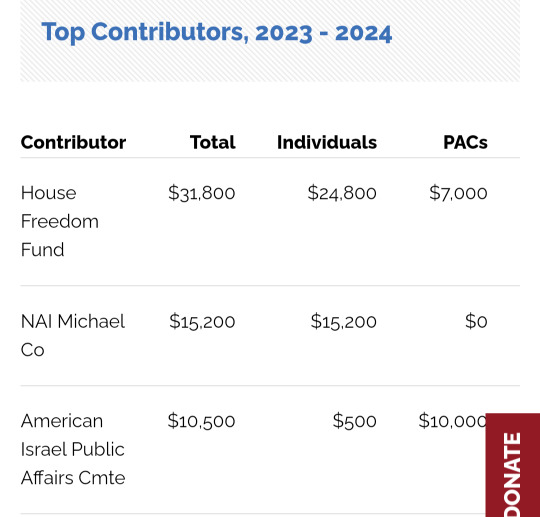
And his number one?
"The Freedom Caucus, also known as the House Freedom Caucus, is a congressional caucus consisting of Republican members of the United States House of Representatives. It is generally considered to be the most conservative and furthest-right bloc within the chamber"
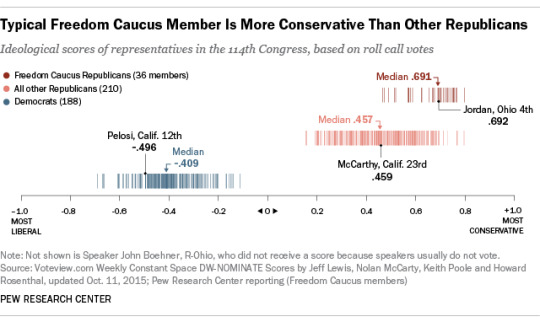
He needs to go
He is absolutely one of the fascists doing the work of things like Project2025. They and the heritage foundation and constantly crossing headlines.
In fact a cursory Google search shows he's Directly helped them come up with policies at least once.
#free palestine#palestine#free gaza#gaza#from the river to the sea palestine will be free#codepink#news#politics#current events#project2025
615 notes
·
View notes
Text
By Jake Johnson
Common Dreams
Jan. 6, 2024
"Billionaires attempting to influence politics from the shadows should not be rewarded with taxpayer subsidies," said Sen. Sheldon Whitehouse.
Legislation introduced Tuesday by a pair of Democratic lawmakers would close a loophole that lets billionaires donate assets to dark money organizations without paying any taxes.
The U.S. tax code allows write-offs when appreciated assets such as shares of stock are donated to a charity, but the tax break doesn't apply when the assets are given to political groups.
However, donations to 501(c)(4) organizations—which are allowed to engage in some political activity as long as it's not their primary purpose—are exempt from capital gains taxes, a loophole that Sen. Sheldon Whitehouse (D-R.I.) and Rep. Judy Chu (D-Calif.) are looking to shutter with their End Tax Breaks for Dark Money Act.
Whitehouse, a member of the Senate Judiciary Committee who has focused extensively on the corrupting effects of dark money, said the need for the bill was made clear by what ProPublica and The Lever described as "the largest known donation to a political advocacy group in U.S. history."
The investigative outlets reported in 2022 that billionaire manufacturing magnate Barre Seid donated his 100% ownership stake in Tripp Lite, a maker of electrical equipment, to Marble Freedom Trust, a group controlled by Federalist Society co-chairman Leonard Leo.
The donation, completed in 2021, was worth $1.6 billion. According to ProPublica and The Lever, the structure of the gift allowed Seid to avoid up to $400 million in taxes.
"It's a clear sign of a broken tax code when a single donor can transfer assets worth $1.6 billion to a dark money political group without paying a penny in taxes," Whitehouse said in a statement Tuesday. "Billionaires attempting to influence politics from the shadows should not be rewarded with taxpayer subsidies."
"We cannot allow millionaires and billionaires to run roughshod over our democracy and then reward them for it with a tax break."
If passed, the End Tax Breaks for Dark Money Act would ensure that donations of appreciated assets to 501(c)(4) organizations are subjected to the same rules as gifts to political action committees (PACs) and parties.
"Thanks to the far-right Supreme Court, billionaires already have outsized influence to decide our nation's politics; through a loophole in the tax code, they can even secure massive public subsidies for lobbying and campaigning when they secretly donate their wealth to certain nonprofits instead of traditional political organizations," said Chu. "We can decrease the impact the wealthy have on our politics by applying capital gains taxes to donations of appreciated property to nonprofits that engage in lobbying and political activity—the same way they are already treated when made to traditional political organizations like PACs."
The new bill comes amid an election season that is already flooded with outside spending.
The watchdog OpenSecrets reported last month that super PACs and other groups "have already poured nearly $318 million into spending on presidential and congressional races as of January 14—more than six times as much as had been spent at this point in 2020."
Thanks to the Supreme Court's 2010 Citizens United ruling, super PACs can raise and spend unlimited sums on federal elections—often without being fully transparent about their donors.
Morris Pearl, chairman of the Patriotic Millionaires, said Tuesday that "there is no justifiable reason why wealthy people like me should be allowed to dominate our political system by donating an entire $1.6 billion company to a dark money political group."
"But perhaps more egregious is the $400 million tax break that comes from doing so," said Pearl. "It's a perfect example of how this provision in the tax code is used by the ultrawealthy to manipulate the levers of government while simultaneously dodging their obligation to pay taxes. We cannot allow millionaires and billionaires to run roughshod over our democracy and then reward them for it with a tax break."
117 notes
·
View notes
Text
Despite record oil production and profits during his White House tenure, industry donors have given very little — just $635,000 — to [Joe Biden's] reelection bid compared with the $7.37 million they bestowed on Trump, according to an analysis from OpenSecrets.[...]
US production and exports of oil and gas have surged under Biden’s watch, with the nation producing a record 13.3 million barrels of crude a day in November — up from some 11 million barrels per day in 2020 before he took office.
Exports of oil and gas have also climbed, with the country shipping nearly twice as much natural gas overseas last year compared with 2020, before Biden took office.
9 Feb 24
71 notes
·
View notes
Text
UPDATE: DECEMBER 1, 2022
On Thursday, the Senate voted 52-43 in favor of a measure that would have ensured rail workers were granted seven days of sick leave in a tentative agreement brokered and enforced on the workers and their employers by President Joe Biden. But the measure needed 60 votes to overcome a filibuster. Democrat Joe Manchin voted no on the sick days, while a handful of Republicans — Sens. Ted Cruz, Josh Hawley, Marco Rubio, Mike Braun, John Kennedy, and Lindsey Graham — voted in favor.
The rejection of the measure means that Biden’s version of the tentative agreement, which passed the Senate 80-15 shortly afterward, will be imposed on workers after Biden signs the bill, averting a looming strike. The new agreement, which represents a marginal improvement on the tentative agreement rejected by workers in late October, ensures only one new paid day off for workers. The companies had furiously opposed even a single additional day off, as it runs in conflict with their strategy to keep staffing as minimal as humanly possible.
Over the past three years, railroad executives have taken over $200 million in compensation as workers attempted to force their hand for sick pay during a bargaining process that has stretched on for years.
The Senate showdown came after progressives in the House successfully demanded a vote on the sick days to accompany approval of the tentative agreement. The strategy was criticized by some on the left, who saw it as selling out workers, arguing instead that the contract should have been amended and sent to the Senate as one piece of legislation.
Rep. Alexandria Ocasio-Cortez, D-N.Y., defended the strategy, saying that unions in her district and nationwide supported the effort to pass additional sick leave in lieu of a viable option to actually sink the proposed tentative agreement. The options available to the unions and to progressives in Congress were extremely limited by the time Biden moved to force the agreement on the workers. The Railway Labor Act allows Congress to enforce collective bargaining agreements in order to avert railway strikes.
“Tanking wasn’t an option bc of GOP votes,” she wrote on Twitter, “we moved to keep sick leave alive.”


A railway union source said that the next phase of the fight would be a demand that Biden include rail workers in a coming executive order that would mandate 56 hours of paid sick leave for federal contractors. The bipartisan support in the House and Senate for the sick days, even though it fell short of 60, could boost the argument for including such workers in the order.
A showdown over a looming railroad strike heads to the Senate floor this week, after a group of progressive Democrats, led by Rep. Jamaal Bowman, D-N.Y., pushed to modify a tentative agreement to include seven days of sick leave. The expanded agreement passed the House 220-206 on Wednesday, and the fight now moves to the Senate, where it remains unclear if there is enough Republican support to overcome a filibuster and send the agreement to President Joe Biden’s desk.
The original agreement was approved by a bipartisan majority, 290-137, with the extra sick days added as an “enrollment correction.” With a strike deadline approaching, Senate Democrats have the choice of insisting Republicans approve the expanded agreement, or folding and allowing the original agreement, which includes just one sick day, to move through. Aside from Sen. Bernie Sanders, I-Vt., and a handful of allies, there appears to be little appetite for such a fight.
The tentative agreement was brokered by Biden and has been publicly rejected by the rank-and-file members of the union. Federal law, however, allows Congress to impose labor agreements in the rail industry to avert strikes. The single day of sick leave itself represented a breakthrough. Time off is an especially contentious issue because the companies have stripped the number of staff on a single train well below the bare bones. With often just two staff for an entire train, if one calls out sick, the entire system is threatened, leading to draconian attendance policies in order to maximize profits.
On Monday, House Speaker Nancy Pelosi had told her caucus that there would be an up-or-down vote on the tentative agreement between the companies and the unions, with no amendments allowed. “This week, the House will take up a bill adopting the Tentative Agreement — with no poison pills or changes to the negotiated terms — and send it to the Senate,” she said.
But Bowman introduced a measure to give seven days of sick leave, joined by the other five members of The Squad and Rep. Chuy Garcia, D-Ill. In the Senate, Sanders floated a companion version. Public pressure quickly led Pelosi to say she would, after all, allow for a vote on changes to the deal, sending out a new letter on Tuesday night amending her approach. On Wednesday, the Congressional Progressive Caucus announced it had reached a deal to support the new floor strategy, which creates two separate votes that would allow the Senate to reject the expanded agreement and pass the original agreement without it needing to come back through the House.
The Senate vote puts pressure on a Republican Party that has increasingly positioned itself as a champion of the working class. Sen. Marco Rubio, symbolic of that attempted transformation, said Tuesday he would follow the lead of the workers.
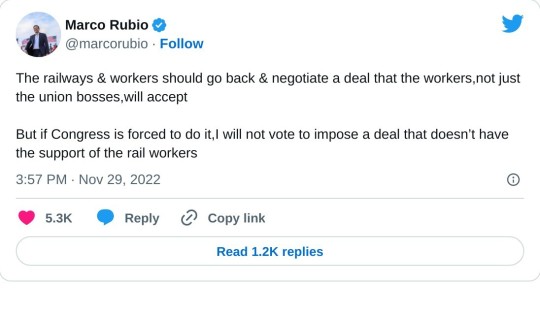
On Tuesday, Sen. John Cornyn, the influential Republican from Texas, signaled openness to expanding sick days to seven, but on Wednesday walked it back. “I just think it’s a bad idea for Congress to try to intervene and renegotiate these collective bargaining agreements between labor and management,” he said.
Rep. Alexandria Ocasio-Cortez, D-N.Y., told Punchbowl News’s Jake Sherman she was fighting “tooth and nail” for the seven days of leave, calling it a “showdown.”
With agreement in the House and a deadline for a strike looming, the dynamics put Senate Republicans in the awkward position of forcing a rail strike in order to block workers from getting an extra six days of sick leave, a position that might be difficult to defend politically amid the economic pain that would be caused by a strike — and that could be ended simply by Republicans agreeing to allow modest time off. But if and when they block the expanded agreement, pressure will be on Democrats to pass the weaker deal and avert the strike.
“Put up or shut up,” said Sanders on MSNBC. “If you can’t vote for this, to give workers today, who really have hard jobs, dangerous jobs, if you can’t guarantee them paid sick leave, don’t tell anybody that you stand with working families.”
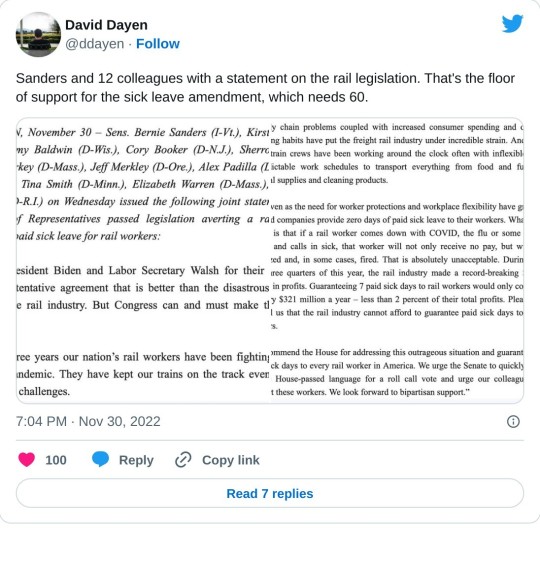
As lawmakers scramble to pass a deal before the December 9 deadline when workers are allowed to strike, unions have hailed lawmakers’ efforts to add sick days into their contract.
The Brotherhood of Maintenance of Way Employes “applauds the representatives in Congress and any Senators that will stand in support of Railroad Workers receiving paid sick leave,” Peter Kennedy, a spokesperson for BMWED, which represents tens of thousands of union rail workers, told The Intercept. “The additional legislation needs to pass so that Railroad Workers will have basic protections against illness, and protection from punishment from the railroads when workers are most vulnerable.”
Railroad companies have spent years softening legislators in preparation for such a moment. As the fight moves to the Senate, it will do so under a Congress whose members have been the recipients of at least $20 million in campaign cash from the rail industry over the past decade.
A coalition of over 400 trade groups signed a letter to congressional leaders on Monday, calling for Congress to act to avert a rail strike. “While a voluntary agreement with the four holdout unions is the best outcome, the risks to America’s economy and communities simply make a national rail strike unacceptable,” they wrote.
A review of campaign finance records shows 19 members of Congress who have received at least $10,000 each from railroad companies in the past election cycle. Another 130 members each received at least a $1,000 contribution from either rail operators or the Association of American Railroads, the largest industry trade group. According to OpenSecrets, AAR has spent over $3.5 million on lobbying this year, consistent with past trends.
Since 2020, the rail companies Union Pacific and BNSF — which have both been locked in tense negotiations with the unions — spent nearly $1.5 million each in direct contributions and donations to congressional campaign political action committees. The two massive employers, along with rail operator Northern Southern, have spent the past decade scaling back their workforces, refusing to give sick days to workers, and operating dangerously understaffed trains.
The Teamsters, which absorbed the Brotherhood of Maintenance of Way Employees in 2004, donated just under $1.5 million to political candidates during the 2022 election cycle. BMWED and two other unions — the Brotherhood of Railroad Signalman and the Sheet Metal, Air, Rail and Transportation Union — also lobbied Congress this year to the tune of $55,000. The PAC for SMART contributed over $1.5 million to political candidates this cycle, while the PAC for the Brotherhood of Locomotive Engineers and Trainmen gave $260,000.
Recipients of Union Pacific’s cash infusion include $30,000 donations to the Democratic Congressional Campaign Committee, the Democratic Senatorial Campaign Committee, the National Republican Senatorial Committee, and the National Republican Congressional Committee. Union Pacific also contributed $10,000 to Sens. Patty Murray, Tammy Duckworth, John Hoeven, John Boozman, and made slightly smaller contributions to Sens. Joe Manchin and Marco Rubio. In the 2022 cycle, the rail company also spent hundreds of thousands of dollars on over 120 House candidates from both parties.
Following Union Pacific’s lead, BNSF contributed $30,000 donations to the National Republican Congressional Committee, Democratic Congressional Campaign Committee, and Democratic Senatorial Campaign Committee. It also gave contributions of $10,000 or more to the PACs affiliated with Sens. Patty Murray, Jerry Moran, Susan Collins, Lindsey Graham, John Thune, James Lankford, Marsha Blackburn, Ben Sasse, Dan Sullivan, Mitch McConnell, John Hoeven, Jon Tester, John Cornyn, Gary Peters, Jack Reed, Debbie Stabenow, and Mark Warner, alongside Reps. Jim Clyburn and Kay Granger.
Union Pacific and Norfolk Southern often compete for the first and second-lowest ratings on Glassdoor for any employer in the U.S. In February, BNSF — which is controlled by billionaire Warren Buffett’s firm Berkshire Hathaway — began penalizing workers taking time off for “fatigue, family emergencies, or illness.” At the same time, a federal judge ruled a rail strike illegal.
“This should not be a political issue,” said Kennedy, the BMWED spokesperson. “This is an issue about protecting our workers who ensure the nation’s rail infrastructure and supply chain function as best as possible. Representatives on both sides of the aisle should unanimously support paid sick days for railroad workers because it is good for the railroads, it is good for their customers, it is good for the American economy, and it is good for the long-term stability and vitality of the railroad industry.”
#us politics#news#the intercept#2022#biden administration#president joe biden#railroads#railway workers#railroad strike#railroad unions#ryan grim#tweet#twitter#rep. alexandria ocasio cortez#sen. marco rubio#sen. bernie sanders#Brotherhood of Maintenance of Way Employes#Association of American Railroads#opensecrets#Union Pacific#bnsf railway#teamsters#Brotherhood of Railroad Signalman#Sheet Metal Air Rail and Transportation Union#Brotherhood of Locomotive Engineers and Trainmen#Berkshire Hathaway#norfolk southern railway#Republicans#democrats
19 notes
·
View notes
Text
Joan E. Greve at The Guardian:
Summer Lee, a Pennsylvania congresswoman, easily beat back a primary challenge on Tuesday, delivering progressives one of their most significant victories yet of this election cycle as they brace for a wave of pro-Israel funding targeting pro-ceasefire candidates.
The Associated Press called the 12th district Democratic primary at 9.21pm, roughly an hour and an half after Pennsylvania polls closed at 8pm ET.
Lee defeated local council member Bhavini Patel, who had criticized the progressive “Squad” member over her calls for a ceasefire in Gaza. Patel had pitched herself as a “pro-Biden Democrat”, suggesting she would better support the president’s agenda in Congress.
But Lee waved off that criticism, and she often pointed to the $1.2bn in government funding she delivered for her Pittsburgh-based district over her first term as evidence of her legislative effectiveness.
“I am so humbled and proud to win my first primary re-election to be the congresswoman for this incredible district I’ve spent my life fighting for,” Lee said in a statement celebrating her victory.
“Our campaign was built on a record of delivering for our democracy, defending our most fundamental rights, and expanding our vision for what is politically possible for our region’s most marginalized communities.”
That argument appeared to sway many of Lee’s constituents as well as local Democratic leaders. In February, the Allegheny county Democratic party formally endorsed Lee for the first time, after the group backed her rival in the 2022 primary.
Lee’s 2022 primary made national headlines because of the involvement of the American Israel Public Affairs Committee (Aipac). According to OpenSecrets, the Super Pac United Democracy Project, which is affiliated with Aipac, spent a total of $3.3m against Lee in 2022. She ultimately defeated her opponent, Pittsburgh attorney Steve Irwin, by less than 1,000 votes, or 0.9 points.
This year, progressives largely expected pro-Israel groups like UDP to again invest heavily in attack ads against Lee. But surprisingly, they chose to stay out of Lee’s primary, a choice the congresswoman’s allies credited to her popularity and legislative record.
Despite the absence of the pro-Israel lobby, one Super Pac did get involved in Lee’s primary to boost Patel’s campaign. The Moderate Pac, which aims to support centrist Democrats and is largely funded by Republican megadonor Jeffrey Yass, spent more than $600,000 supporting Patel. Lee and her allies turned Yass’ involvement in the race into a campaign issue, lambasting the billionaire’s Super Pac contributions.
[...]
Although UDP opted to stay out of Lee’s race, progressive leaders believe her successful campaign strategy could still be instructive for other pro-ceasefire lawmakers expected to be targeted by pro-Israel groups in their primaries. Aipac and its political affiliates reportedly plan to spend $100m this election cycle, after pouring nearly $50m in to the 2022 midterms.
At least two other “Squad” members, Jamaal Bowman of New York and Cori Bush of Missouri, have already attracted primary challengers, and Aipac has already endorsed their opponents. Lee alluded to Bowman and Bush on Sunday, telling supporters that her victory would reverberate around the country.
AIPAC and pro-Israel Apartheid groups got handed an L last night, as incumbent pro-Gaza Ceasefire progressive Dem Summer Lee holds on in the PA-12 primary, fending off Bhavini Patel.
#Summer Lee#2024 Pennsylvania Elections#2024 Elections#2024 US House Elections#Pennsylvania#Bhavini Patel#Jeffrey Yass#AIPAC#United Democracy Project#Ceasefire NOW
13 notes
·
View notes
Text
Behind Trump’s campaign cash crunch: Small-dollar donor fatigue, major donor hesitation
Former President Donald Trump is facing two major fundraising problems: a shortage of big money interest and a drop in small-dollar donor support.
The decline in small-dollar contributors could be a significant obstacle, as the former president seeks to cobble together a 2024 war chest.
Small-dollar donors are critical to Trump’s ability to raise enough money to fund his presidential campaign.
Falling behind Biden
Evidence from earlier in the 2024 election cycle already hinted at an erosion of Trump’s small-dollar donor base, or support of $200 or less.
In 2023, Trump’s reelection campaign raised 62.5% less money from small-dollar donors than it did in 2019, the year before the last presidential election.
In January of this year, Trump’s campaign reported raising around $3 million from small-dollar donors, according to data from OpenSecrets.
This may sound like a lot of money, but consider that Biden’s political operation raised nearly $2 million in just one day, Feb. 29, according to a campaign spokesman for the president.
7 notes
·
View notes
Text
Y'all ever look at this?
I was doing some research about healthcare and stumbled into this lobbying tracker and I am...pissed off???
Free rage machine over at opensecrets

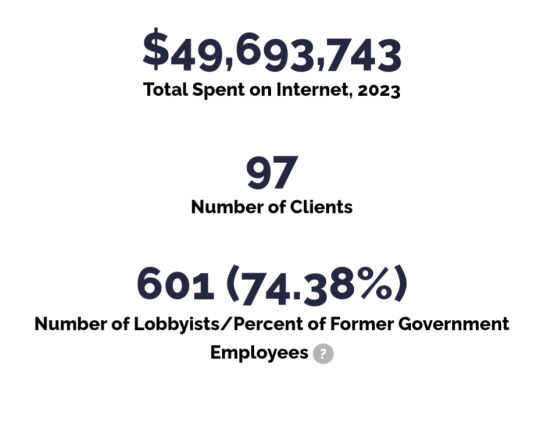
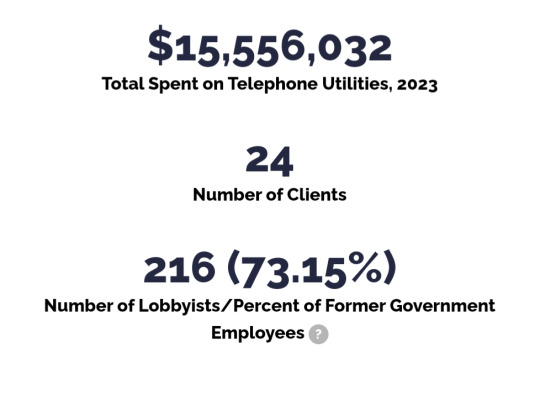

#politics#Lobbying#us politics#us government#congress#senate#oil#gas#clean energy#climate change#data protection#capitalism#healthcare#health insurance#oil company#gas company
64 notes
·
View notes
Text

ritchie torres' opensecrets page btw. shocker!
#he SUCKSSSS#just what the good people of the bronx neeed - a guy bought out by the pro israel lobby and real estate developers#the fact that he's bought by real estate considering the insidiousness of gentrification in the bronx is soooo disgusting
9 notes
·
View notes

